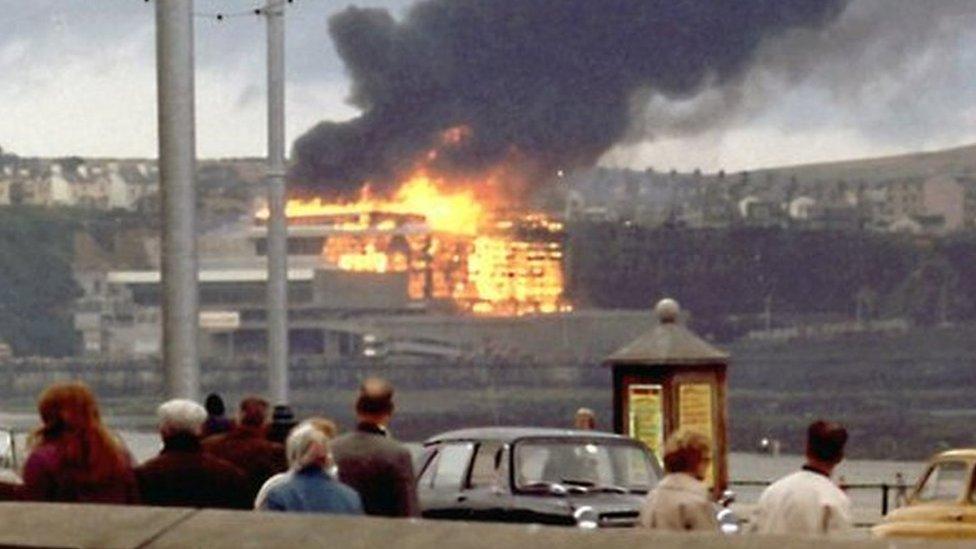Summerland: 'I no longer feel the need to hide my scars'
- Published
Ruth McQuillan-Wilson said her scars were her "story" but it took her a long time to accept them
Fifty years ago, 3,000 people were enjoying an evening of entertainment at the Summerland leisure complex on the Isle of Man when fire broke out.
Fifty people died as a result of the blaze and a further 80 were injured.
Ruth McQuillian-Wilson, who was then a five-year-old on a family holiday from County Down in Northern Ireland, suffered severe burns.
Five decades on, she said she no longer hides her scars like she once did because "my scars are my story".
Recalling the night of 2 August 1973, she said her family had enjoyed a day exploring the island's capital before they all headed to the complex on Douglas Promenade.
Warning: The following contains descriptions that some may find distressing
She said once inside, her father became uneasy after noticing smoke coming from a ventilation shaft, and despite an announcement that it was from a chip pan fire, he took the decision to get his family out.
"We went downstairs immediately and as we reached the lower levels, flames just erupted from the area of the amusement arcade," she said.
"He grabbed my sister, I was holding on to his coat, and he jumped over the railings thinking I was with Mum, and they managed to get out.
"Mum had been caught with the rest of the people panicking and swept back upstairs.

If you're affected by the issues in this piece, you can find support from BBC Action Line

"The flames were coming up through the stairs and everybody else was rushing to get away from them and I was just there, and I was burning at this point.
"And she pushed and pushed against the people, and she wasn't very big, to try and get back to me."
After being reunited, the mother and daughter climbed down on to the roof of a kiosk on the floor below, and were pulled out of the building through a broken pain of glass by a firefighter.
"They took me away and put me in a police car and my legs stuck to the seats, I can remember that clearly, and skin hanging between the fingers."
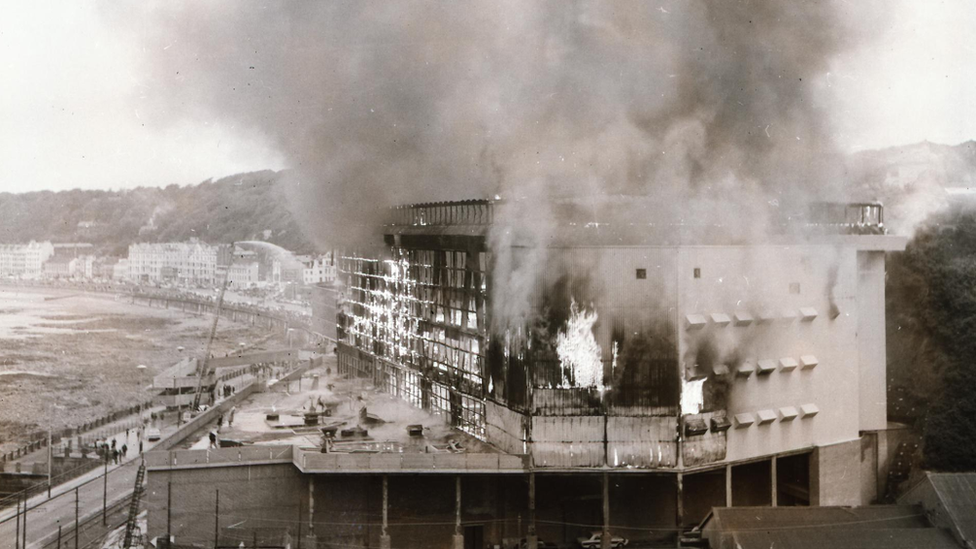
The fire took hold at the complex within a matter of minutes
Ms McQuillian-Wilson went through years of skin grafts and treatment, including reconstructive work to help her walk again.
She said she kept her scars hidden when she was growing up, "because I couldn't be myself when they were on show".
However, she said in recent years, she had decided to no longer do that.
"I don't hide it now because I read up on the Dunblane massacre and there's a very brave lady there who said 'my scars are my story'," she said.
"My scars are my story.
"It took me a long time to accept, but that's the way I feel now, I'm not going to hide it.
"This happened to me and I've survived. I'm lucky, so I'm not going to hide that."
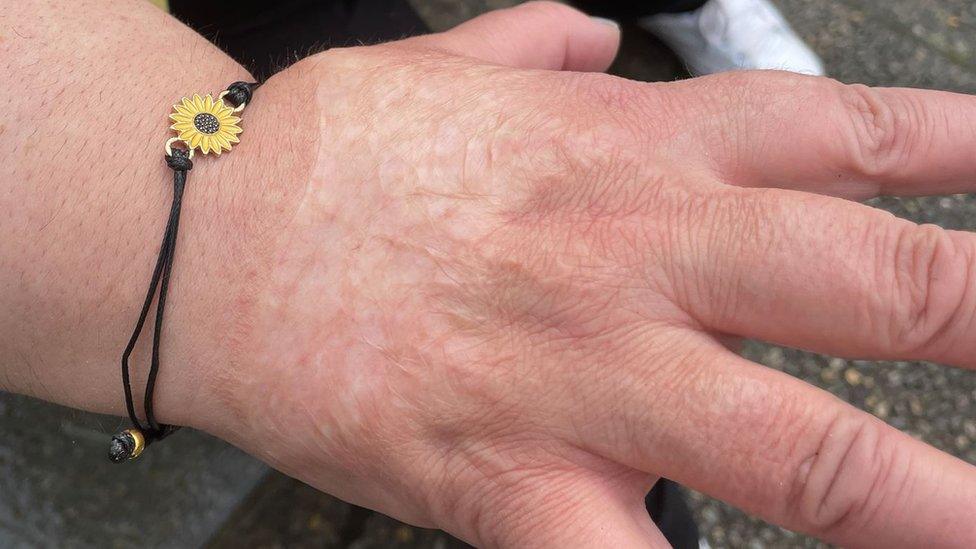
Ruth McQuillian-Wilson said she now accepted the scars on her legs and hands were part of her story
Ms McQuillian-Wilson said the commemorations to mark the 40th anniversary of the tragedy in 2013 and the creation of a permanent memorial had helped some of those who were caught up in the tragedy to start to come to terms with what happened.
"For a long time, nobody had anybody to talk to," she said.
"When I started my journey, there wasn't anybody, not one person, and it was a lonely place to be.
"I didn't talk about Summerland when I was a child because no-one understood, but now they can and that's just all I ever wanted."
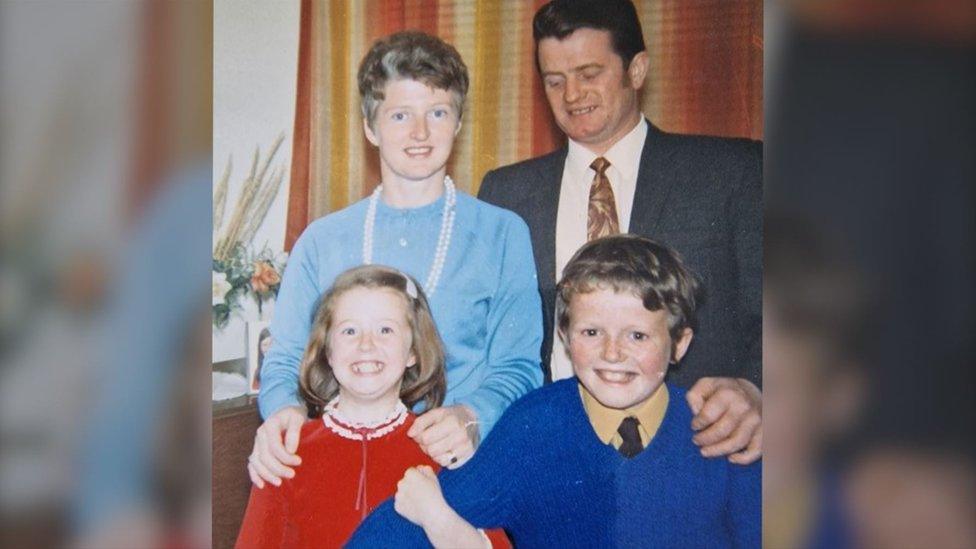
The Stevenson family were on holiday in the Isle of Man when the tragedy struck
Elaine Anderson, who was nine-years-old at the time, was also caught up in the fire.
She was on holiday with her family from Kilmarnock in Scotland and had been playing with her older brother downstairs in the leisure complex when the tragedy unfolded.
Their parents, Sheena and Alex, had been watching from the floor above.
Ms Anderson and her brother escaped, having heard their parents call down to them that they would come down "in a minute" shortly before the chaos broke out, but could not find their parents outside.
The children stayed with the landlady of the guesthouse the family had booked to stay at during their holiday in the days after the fire, until the confirmation came that their parents had both died.
The orphaned siblings were then collected by family and taken back to Scotland.
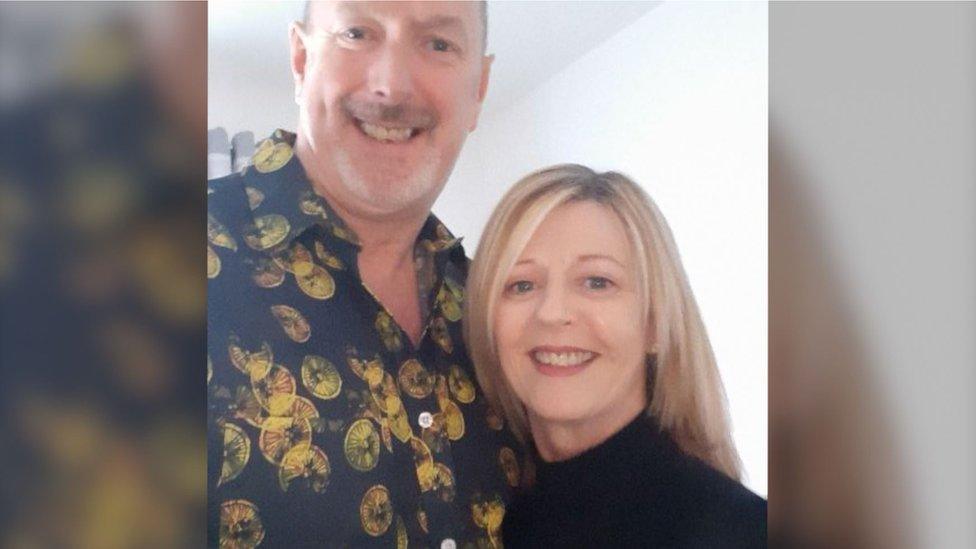
Mr Anderson said his wife, who died of lung cancer in 2022, remained a "positive" person all her life
Kenny Anderson said the ordeal had led his wife, who died of lung cancer at the age of 58 in 2022, to become "the most resilient woman that I've ever known".
He said what actually happened to her parents in the complex that night had always remained "a mystery" to her, but she had built a resilience and strength to deal with difficult times and had been incredibly "strong willed".
He added that despite the tragedy in her life, she had "lived life to the full" and had remained a "positive" person all her life.
Sixteen-year-old Robert E Wilson, from Jordanstown in Northern Ireland, was also visiting the island with his family.
He was at the complex with his parents and grandmother when the fire broke out and recalls the moment he realised what was happening.
He said he became aware of crowds gathering on the floors below him and as he looked up he saw "there was a large cloud of black smoke that was rapidly gaining in size".
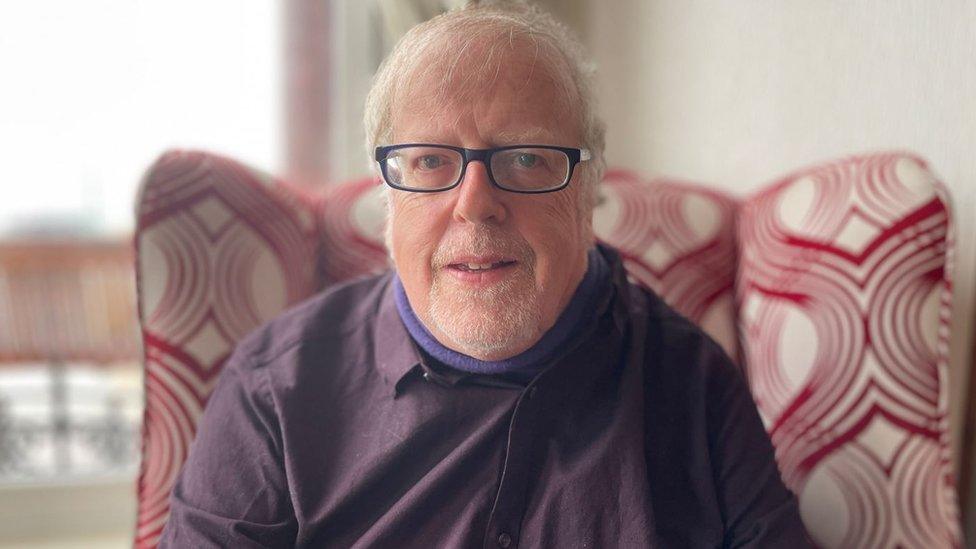
Robert E Wilson said the events had a lasting impact on his behaviour
At that moment the sounds and atmosphere changed all around him in an instant as panic set in, he said.
By the time he made it to ground floor the "smoke was really everywhere, the heat was intense and the amusement arcade was basically a wall of flame".
"Once the flames started to invade the main building, I think that's when really all hell broke loose, it went up so quickly," he said.
After escaping onto one of the terraces with burns to his hands, he was reunited with the rest of his family.
Looking back at the pace at which the events unfolded, he said it was a "very frightening experience" but he was "thankful for escaping with such minor injuries".
He said: "A lot was down to the moment that you got out, about getting out at that precise moment.
"Once I got out I looked around and the entrance where I had got out, within about 20 seconds had just gone up in flames."
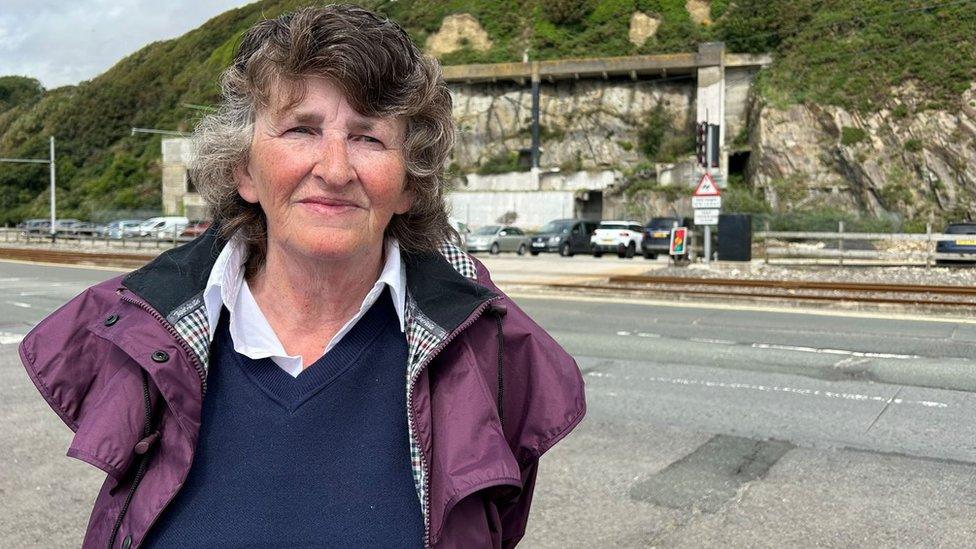
Maggie Clarke was caught in the rush to leave the complex when the fire broke out
Manx resident Maggie Clark was visiting from Glasgow to work on the island during the summer season in 1973 and was a regular visitor to the Summerland complex.
Just after going through the main doors, the staff stopped her from going any further because they were "trying to contain a small fire up the back", she said.
She said: "In what seemed like a matter of seconds that smoke shot across the whole floor, and that's when the flames erupted.
"For a moment the place went totally silent, you couldn't hear a pin drop. And then there was just this mad rush for the exit.
"I went down at the turnstile, and ended up getting trampled.
"To this day I still don't know how I got out, it was like inching your way out but on your stomach, until I got to the outside doors."
She said she recalled seeing a lady who had been forced through glass doors by the fire who was "just covered in blood".
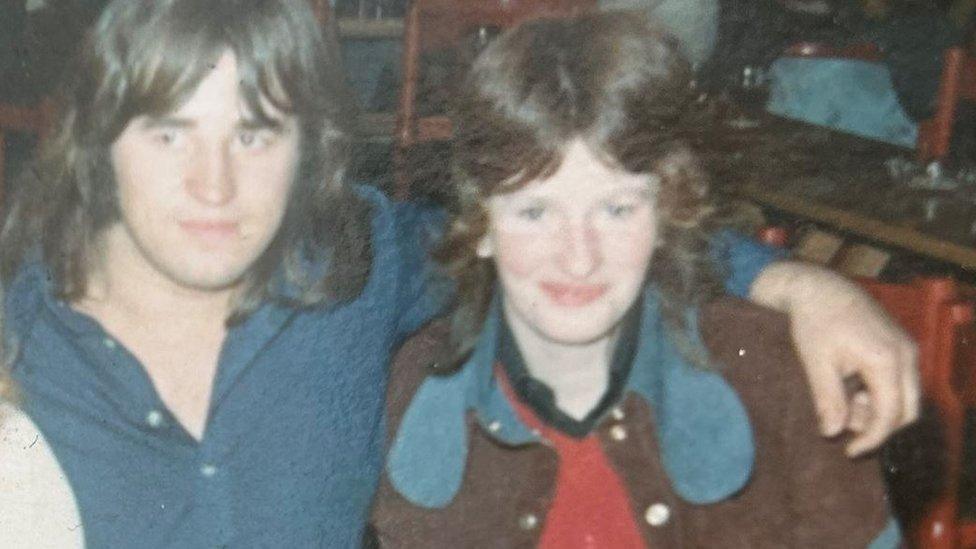
Maggie Clarke regularly met up with friends at Summerland
Ms Clarke said: "I was lucky, I didn't see the horror that so many others saw, I saw a glimpse of the start of it."
She said talking about it in the run up to the anniversary "brings up emotions that you buried way back then, that you didn't actually allow yourself to feel".
"It's a good thing because you've actually got to face all these things at some time," she said.
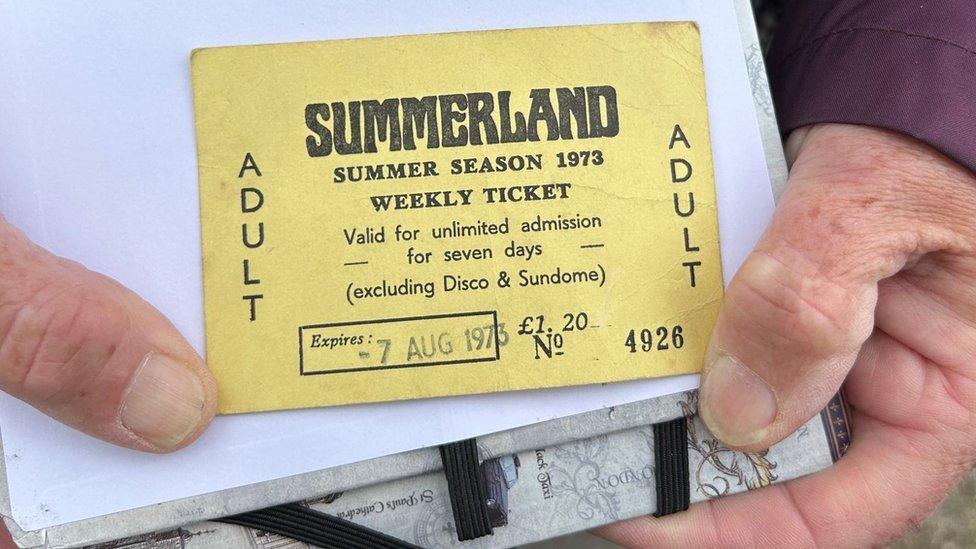
Many people bought weekly tickets to the complex
Ms Clarke added: "You don't know what tomorrow brings or if tomorrow's even going to come."
"I got my tomorrows, 50 people up there didn't. And that's what makes it more poignant to remember and not let people forget."
A service to mark the 50th anniversary of the tragedy is set to take place at the memorial in the Kaye Memorial Garden on Douglas Promenade at 19:00 BST.

Why not follow BBC Isle of Man on Facebook, external and Twitter, external? You can also send story ideas to IsleofMan@bbc.co.uk, external
Related topics
- Published1 August 2023
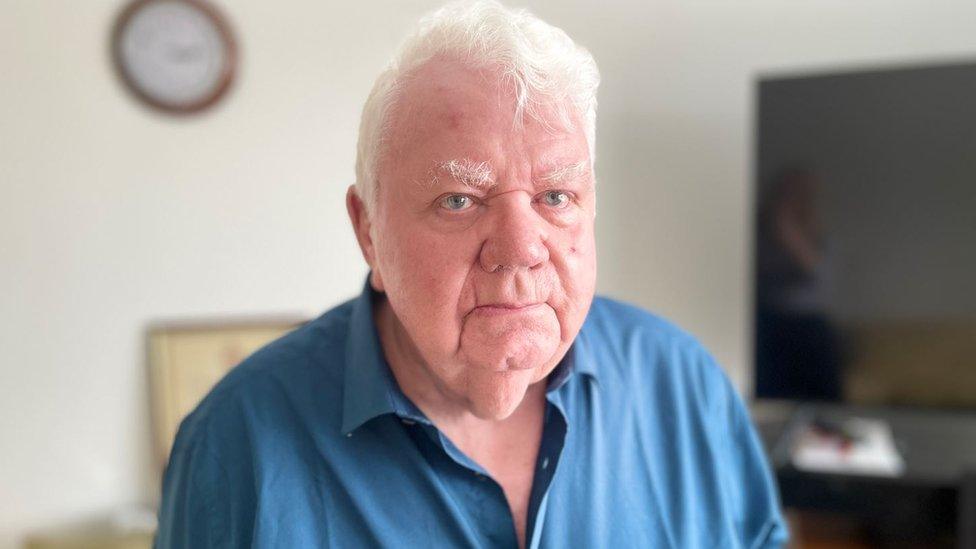
- Published31 July 2023
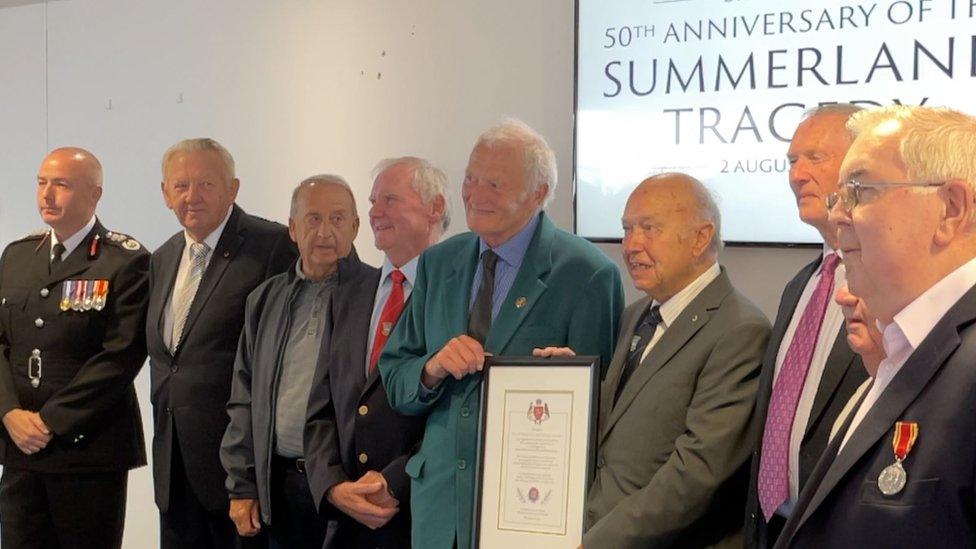
- Published30 July 2023
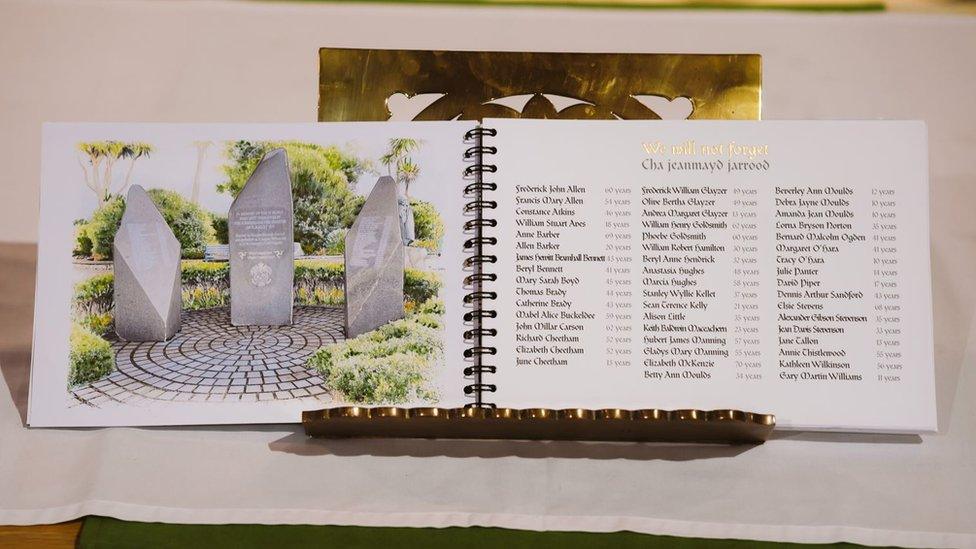
- Published18 July 2023
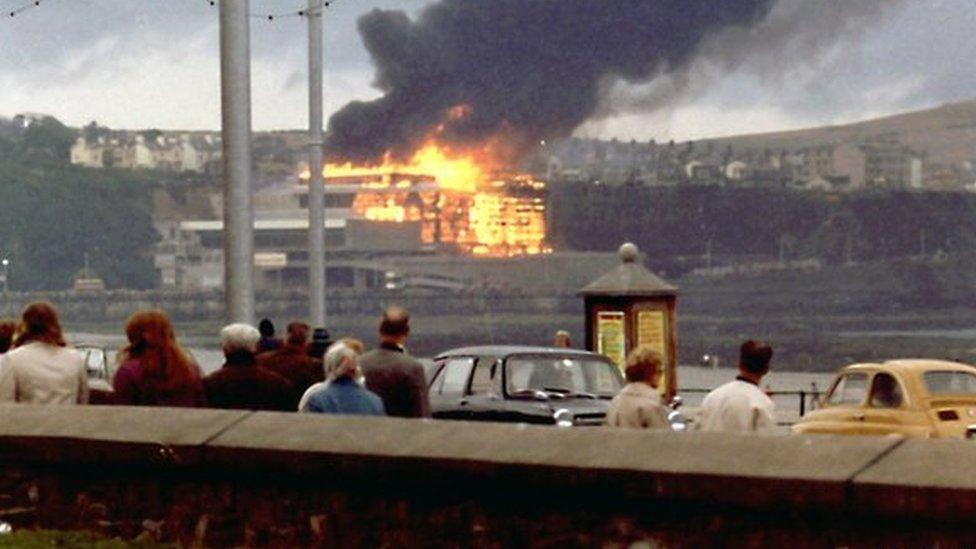
- Published25 June 2023

- Published22 March 2023
